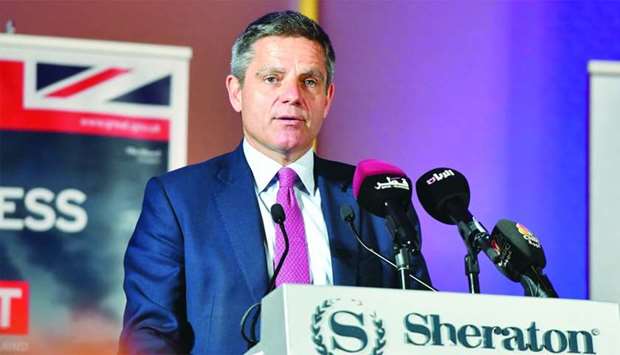Bilateral trade between Qatar and the UK stood at £6.7bn, registering a 21% growth in 2019, Her Majesty’s Trade Commissioner for the Middle East, Simon Penny, said during the "3rd SMEs Conference" held in Doha on Monday.
In his welcome speech, Penny said the UK supports more businesses in Qatar “than in any other country in the world” through the UK Export Finance. According to Penny, there are more than 700 British companies registered in Qatar, as well as many more that are seeking investment or collaborative opportunities across multiple sectors.
“We currently have more than £3.5bn worth of financial support to Qatar; there’s still an additional £1.5bn capacity that we have available, and this is available to Qatari companies that want to buy goods and services from the UK, and it is also available to UK companies that are involved in the supply chain and that are looking to de-risk some of the financial risks that come with doing business overseas,” he said.
As trade commissioner, Penny stressed his role to establish closer partnerships on a government-to-government level and work together to tackle common challenges and seek solutions that would benefit both nations.
The UK is home to some 5.8mn small businesses, almost all of which are classified as SMEs, Penny pointed out. Citing figures from the Federation of Small Businesses, Penny said these British companies have a combined turnover worth £1.9tn, and support 16.1mn jobs. He stressed that 60% of all private employment in the UK is in SMEs.
Qatar is well on its way in implementing its National Vision 2030, and preparing to host the World Cup in 2022; this offers enormous opportunities for partnerships between the UK and Qatar governments, its businesses, and its citizens, Penny said.
“The UK has made strides that attract investors, with an open liberal economy, world-class talent, and business-friendly environment. And it’s for those reasons that the UK is the main destination for Qatari investments,” he said.
“Events like this are so important in bringing together SMEs with investment opportunities here in Qatar. By investing in Qatar, British companies can have easier access to a range of opportunities by taking advantage of the new free zones and Qatar Airways’ global reach,” Penny pointed out.
The UK has, at the highest levels, committed to supporting these ambitious plans for the future across key areas where the UK could work closely with Qatar, Penny said, citing his meetings with the Supreme Committee for Delivery and Legacy (SC) and the Qatar Central Bank, as well as other organisations.
“The UK has now left the European Union (EU) giving us the freedom to negotiate, sign, and ratify new trade deals for the first time in 40 years. Qatar and the wider GCC are keen partners to the UK.
“In fact, bilateral trade between the UK and the Gulf grew by 90% in the last 10 years. And outside the EU, the Gulf is the UK’s seventh largest export market, second only the US,” Penny stressed.
He said the Qatar National Vision 2030 and the UK’s industrial strategy share themes from healthcare to clean growth, to technology and transport. “It’s in these areas that partnership between both countries would have a lasting and meaningful impact on future generations,” he added.


